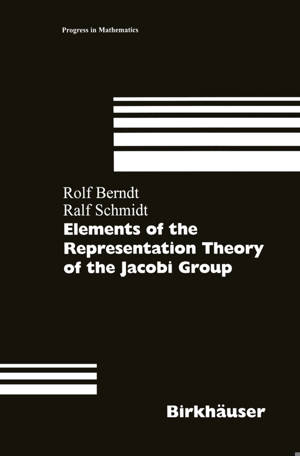
- Afhalen na 1 uur in een winkel met voorraad
- Gratis thuislevering in België vanaf € 30
- Ruim aanbod met 7 miljoen producten
- Afhalen na 1 uur in een winkel met voorraad
- Gratis thuislevering in België vanaf € 30
- Ruim aanbod met 7 miljoen producten
Zoeken
€ 52,95
+ 105 punten
Uitvoering
Omschrijving
After Pyatetski-Shapiro [PSI] and Satake [Sal] introduced, independent of one another, an early form of the Jacobi Theory in 1969 (while not naming it as such), this theory was given a definite push by the book The Theory of Jacobi Forms by Eichler and Zagier in 1985. Now, there are some overview articles describing the developments in the theory of the Jacobi group and its automor- phic forms, for instance by Skoruppa [Sk2], Berndt [Be5] and Kohnen [Ko]. We refer to these for more historical details and many more names of authors active in this theory, which stretches now from number theory and algebraic geometry to theoretical physics. But let us only briefly indicate several - sometimes very closely related - topics touched by Jacobi theory as we see it: - fields of meromorphic and rational functions on the universal elliptic curve resp. universal abelian variety - structure and projective embeddings of certain algebraic varieties and homogeneous spaces - correspondences between different kinds of modular forms - L-functions associated to different kinds of modular forms and autom- phic representations - induced representations - invariant differential operators - structure of Hecke algebras - determination of generalized Kac-Moody algebras and as a final goal related to the here first mentioned - mixed Shimura varieties and mixed motives.
Specificaties
Betrokkenen
- Auteur(s):
- Uitgeverij:
Inhoud
- Aantal bladzijden:
- 216
- Taal:
- Engels
- Reeks:
- Reeksnummer:
- nr. 163
Eigenschappen
- Productcode (EAN):
- 9783034897686
- Verschijningsdatum:
- 23/08/2014
- Uitvoering:
- Paperback
- Formaat:
- Trade paperback (VS)
- Afmetingen:
- 156 mm x 234 mm
- Gewicht:
- 335 g

Alleen bij Standaard Boekhandel
+ 105 punten op je klantenkaart van Standaard Boekhandel
Beoordelingen
We publiceren alleen reviews die voldoen aan de voorwaarden voor reviews. Bekijk onze voorwaarden voor reviews.











